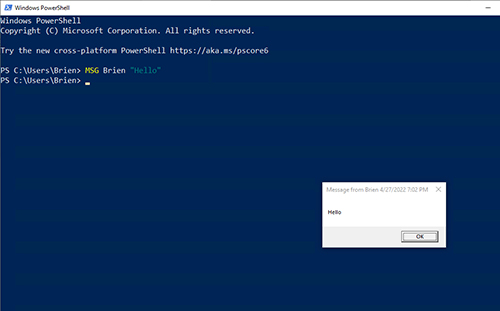Posey's Tips & Tricks
Unpacking Windows 11 Worst New Feature
Custom pop-up messages sound like a road to employee annoyance.
Microsoft recently announced a number of new features that are going to making their way into Windows 11. In all honesty, I've had my hands full with several big projects lately so I haven't really had a chance to assess all of these new features. Even so, there was one feature that really jumped out at me as being particularly egregious.
The feature that I'm referring to is an ability to display pop-up messages on a user's device. In all fairness, admins had this ability for years. You can display a pop-up message on a user's PC by opening PowerShell and typing the MSG command, followed by the user's name and the message that you want to send. You can see an example of this in Figure 1.
 [Click on image for larger view.] Figure 1. It is possible to send pop-up messages through PowerShell.
[Click on image for larger view.] Figure 1. It is possible to send pop-up messages through PowerShell.
Even though it is possible to use PowerShell as a platform for sending pop-up messages to users, there are a couple of things that make the forthcoming Windows 11 pop-up feature different. First, the MSG command that I showed you in the previous figure is somewhat obscure. It isn't something that's super heavily used, and I'm guessing that a lot of admins probably don't even know that this command exists. Conversely, Microsoft is actively encouraging the use of pop-ups through its new Windows 11-targeted messaging feature.
Another difference between the two features is that unlike PowerShell, Windows 11 will give admins the ability to display messages on the Windows desktop, on the lock screen, above the task bar and possibly other places. There is even going to be a feature that allows admins to configure viewing frequency, which will presumably allow the same message to be displayed over and over again at targeted intervals.
At the beginning of this article, I described the new targeted messaging feature as egregious and you may be wondering why I see it as such. There are a couple of reasons.
For starters, Windows 11 is already really bad about nagging users with constant alerts and messages. In fact, these alerts are one of the main reasons why I still run Windows 10 on my primary desktop. At best, the alerts are really distracting when I'm trying to concentrate on whatever it is that I happen to be writing. At worst, the alerts can ruin my work. If I'm recording a screencast video, for example, a pop up message would force me to stop what I'm doing, clear the message and start over.
The targeted messaging feature doesn't necessarily mean that employees are going to be bombarded with additional messages. I'm sure that there are some organizations that will choose not to use this feature. For those that do opt to use the targeted messaging feature, I think that the feature is probably going to become a nuisance.
Based on what I have read, Microsoft seems to be envisioning the targeted messaging feature as a tool for IT pros to be able to communicate with their users right on the desktop. I can actually envision situations in which having that capability might be helpful. If, for example, an admin needed to reboot an application server, they could send a pop-up message to all of their users warning them that the application would be going down in fifteen minutes.
The problem comes when others within the organization began to realize that IT has this capability. It's only a matter of time before the IT department begins receiving request from other departments to send out pop-up messages on their behalf. For example, the HR department might request the ability to send out pop-up messages reminding employees about the latest mandatory training session.
I also think that the targeted messaging feature could be ripe for abuse by Microsoft itself. To be perfectly clear, I haven't seen anything from Microsoft indicating that they are considering using the feature as a way of communicating with customers. However, I can just imagine a world in which Windows users receive pop-ups on their desktop advertising Microsoft 365 subscriptions, app store games, content streaming services or whatever Microsoft or its partners feel like advertising on a given day.
I could end up being wrong about the targeted messaging feature, and it might ultimately prove to be really helpful. Or it could be one of those things that nobody ends up using. As it stands right now though, this is one feature that just seems like a bad idea.
About the Author
Brien Posey is a 22-time Microsoft MVP with decades of IT experience. As a freelance writer, Posey has written thousands of articles and contributed to several dozen books on a wide variety of IT topics. Prior to going freelance, Posey was a CIO for a national chain of hospitals and health care facilities. He has also served as a network administrator for some of the country's largest insurance companies and for the Department of Defense at Fort Knox. In addition to his continued work in IT, Posey has spent the last several years actively training as a commercial scientist-astronaut candidate in preparation to fly on a mission to study polar mesospheric clouds from space. You can follow his spaceflight training on his Web site.